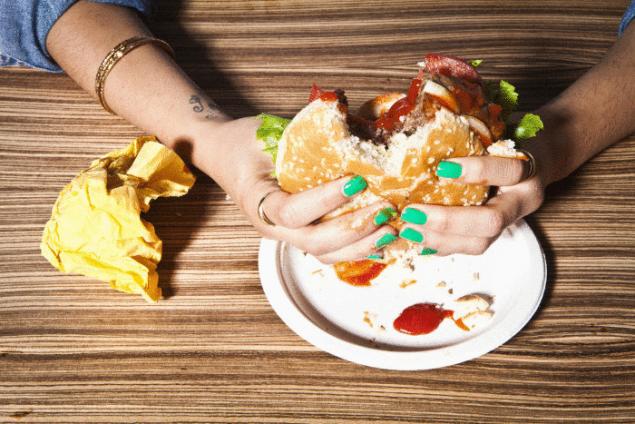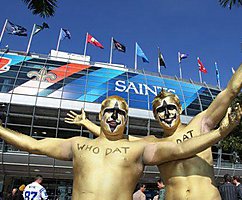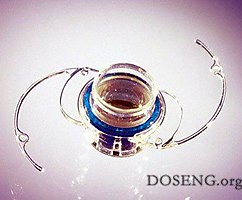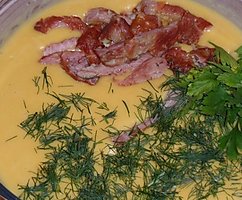Bacteria cause us to lose weight and to gain weight. And they don't like fast food
 Bashny.Net
Bashny.Net
While filming the famous documentary Supersize Me's Morgan Spurlock spent a month consumed huge portions of food from McDonald's. As a result, he gained weight, hurt my liver and have experienced this syndrome of addiction. This phenomenon is commonly explained by the fact that fast food is a poisonous mixture of carbohydrates, TRANS fats and various preservatives. It is, say, true, but what is proximate cause? 
In the dark in our gut is inhabited by tiny little creatures who hate junk food – hundreds of billions of microbes. They help digest food, provide us with many vitamins and help to maintain health.
We don't know until the end how our lives depend on microbes. They are not just useful – they are an integral part of us. Judge for yourself: about 2% of body weight (average of half a kilogram) is clean microbiota. Bacterial cells in the us is 15 times greater than our own. These bacteria are more than three million genes. For comparison, the human genome contains approximately one hundred times less, and 40 genes are inherited, again, from bacteria. Strictly speaking, we are walking colonies of bacteria. And certainly without them we would not have survived, because your "good" bacteria protect us from aliens and deadly.
The turning point was the story of the obese mice. American geneticist Jeffrey Gordon and his colleagues from the Washington-based Center for genomic research are among the first found that the composition of the flora from the lean mice and their corpulent relatives are very different. Moreover, when the scientists took a complete microflora from mice and transplanted them into skinny ones gained weight. Conversely, full mouse dropped weight when they transplanted bacteria from the intestines thin.
Further – more, as shown by subsequent experiments on mice and on humans, even the most gentle courses of antibiotics destroy the bacteria in the gut. Over time, recovering the quantity but not the quality, and species diversity of the microbiota becomes much poorer. How about wildlife when a forest burns and instead of hundreds of different species of trees in its place put solid canadian pine. It would be so bad, but it turned out that with such a poor set of bacterial strains of laboratory mice are much more prone to obesity, diabetes and metabolic syndrome. In General, over the past five years has been repeatedly proven that microorganisms in the gut affect metabolism and can work in both directions: the "bad" microbiota triggers the disease, "healthy" – it promotes recovery.
Studies in mice have shown that when the diet is harmful fatty food macrobiotically their stomachs were changed almost completely. The situation has been partly remedied with the help of probiotics. In another study of the African tribe in the course of two weeks put on the "African-American" diet of fast food, but a group of African Americans asked to eat legumes and vegetables in the diet of savages. As a result, the people of the tribe were similar to the development of diabetes and in African-Americans, on the contrary, the blood has improved considerably.
It turned out that those and other radically changed the intestinal flora. Until recently, the effect of fast food on gastric microbiota has not been investigated. Tim Spector, a scientist and author of the famous book The Diet Myth, decided to conduct an experiment on their own. His son, Tom volunteers volunteered: within ten days he had to eat only at McDonalds, and in the evenings to drink beer with chips. He collected stool samples before, during and after the experiment, and sent them to three independent laboratories. Three days later, the young man quickly began to tire, his color has deteriorated, and the strength seemed to have left. He admitted that at the end of the experiment ran to the store for fresh salad and fruit.
The test results were shocking: the intestinal microflora Tom was almost completely destroyed. Colony of bifidobacteria to constrain inflammation, became extinct, and the overall diversity of microorganisms decreased by 1,400 species, i.e. 40%. The body is very important. Importantly, even two weeks after the end of the fast pudney diet microflora has not recovered. Such violations often occur in people with obesity, diabetes and metabolic syndrome.
In September 2013 in the journal Nature Communications published an article by Russian scientists who examined the microbiota of people living in cities (with antibiotics, fast food and all the rest) and in villages (that is, in theory, closer to nature, without antibiotics and junk food). Work, in which participated more than three dozen researchers, lasted three years: during the year, collected samples for analysis, a year was taken by the DNA, and about a year – data processing and analysis.
"We found that species diversity of bacteria in the intestine among urban residents is much poorer than rural, – says Dmitry Alekseev, co-author of the work. – Citizens in Russia, Europe and America in the microbial composition as twins, but the villagers, even within our country, very much different. That is, in the human gut global. The people around the world eat the same burgers, which contain antibiotics, microbiota becomes poorer, and then it leads to different diseases."
Exactly how different diseases are associated with changes in microbial composition in the intestine, is not precisely known. Proven only that there is a connection. As funny as it may sound, we are the masters of their bacteria and should provide them a variety of healthy foods: greens, vegetables, and dairy products. Then they will reward us handsomely. published
P. S. And remember, only by changing their consumption — together we change the world! ©
Source: lchf.ru/6036

In the dark in our gut is inhabited by tiny little creatures who hate junk food – hundreds of billions of microbes. They help digest food, provide us with many vitamins and help to maintain health.
We don't know until the end how our lives depend on microbes. They are not just useful – they are an integral part of us. Judge for yourself: about 2% of body weight (average of half a kilogram) is clean microbiota. Bacterial cells in the us is 15 times greater than our own. These bacteria are more than three million genes. For comparison, the human genome contains approximately one hundred times less, and 40 genes are inherited, again, from bacteria. Strictly speaking, we are walking colonies of bacteria. And certainly without them we would not have survived, because your "good" bacteria protect us from aliens and deadly.
The turning point was the story of the obese mice. American geneticist Jeffrey Gordon and his colleagues from the Washington-based Center for genomic research are among the first found that the composition of the flora from the lean mice and their corpulent relatives are very different. Moreover, when the scientists took a complete microflora from mice and transplanted them into skinny ones gained weight. Conversely, full mouse dropped weight when they transplanted bacteria from the intestines thin.
Further – more, as shown by subsequent experiments on mice and on humans, even the most gentle courses of antibiotics destroy the bacteria in the gut. Over time, recovering the quantity but not the quality, and species diversity of the microbiota becomes much poorer. How about wildlife when a forest burns and instead of hundreds of different species of trees in its place put solid canadian pine. It would be so bad, but it turned out that with such a poor set of bacterial strains of laboratory mice are much more prone to obesity, diabetes and metabolic syndrome. In General, over the past five years has been repeatedly proven that microorganisms in the gut affect metabolism and can work in both directions: the "bad" microbiota triggers the disease, "healthy" – it promotes recovery.
Studies in mice have shown that when the diet is harmful fatty food macrobiotically their stomachs were changed almost completely. The situation has been partly remedied with the help of probiotics. In another study of the African tribe in the course of two weeks put on the "African-American" diet of fast food, but a group of African Americans asked to eat legumes and vegetables in the diet of savages. As a result, the people of the tribe were similar to the development of diabetes and in African-Americans, on the contrary, the blood has improved considerably.
It turned out that those and other radically changed the intestinal flora. Until recently, the effect of fast food on gastric microbiota has not been investigated. Tim Spector, a scientist and author of the famous book The Diet Myth, decided to conduct an experiment on their own. His son, Tom volunteers volunteered: within ten days he had to eat only at McDonalds, and in the evenings to drink beer with chips. He collected stool samples before, during and after the experiment, and sent them to three independent laboratories. Three days later, the young man quickly began to tire, his color has deteriorated, and the strength seemed to have left. He admitted that at the end of the experiment ran to the store for fresh salad and fruit.
The test results were shocking: the intestinal microflora Tom was almost completely destroyed. Colony of bifidobacteria to constrain inflammation, became extinct, and the overall diversity of microorganisms decreased by 1,400 species, i.e. 40%. The body is very important. Importantly, even two weeks after the end of the fast pudney diet microflora has not recovered. Such violations often occur in people with obesity, diabetes and metabolic syndrome.
In September 2013 in the journal Nature Communications published an article by Russian scientists who examined the microbiota of people living in cities (with antibiotics, fast food and all the rest) and in villages (that is, in theory, closer to nature, without antibiotics and junk food). Work, in which participated more than three dozen researchers, lasted three years: during the year, collected samples for analysis, a year was taken by the DNA, and about a year – data processing and analysis.
"We found that species diversity of bacteria in the intestine among urban residents is much poorer than rural, – says Dmitry Alekseev, co-author of the work. – Citizens in Russia, Europe and America in the microbial composition as twins, but the villagers, even within our country, very much different. That is, in the human gut global. The people around the world eat the same burgers, which contain antibiotics, microbiota becomes poorer, and then it leads to different diseases."
Exactly how different diseases are associated with changes in microbial composition in the intestine, is not precisely known. Proven only that there is a connection. As funny as it may sound, we are the masters of their bacteria and should provide them a variety of healthy foods: greens, vegetables, and dairy products. Then they will reward us handsomely. published
P. S. And remember, only by changing their consumption — together we change the world! ©
Source: lchf.ru/6036
Tags
See also
Stars and their tattoos
Stars of wax
RIP
The main point
50 amazing facts about the world around us
10 tips from Mahatma Gandhi
Do not like your job
Mahatma Gandhi: 10 tips to change the world
Bruce hood: What makes us human

















